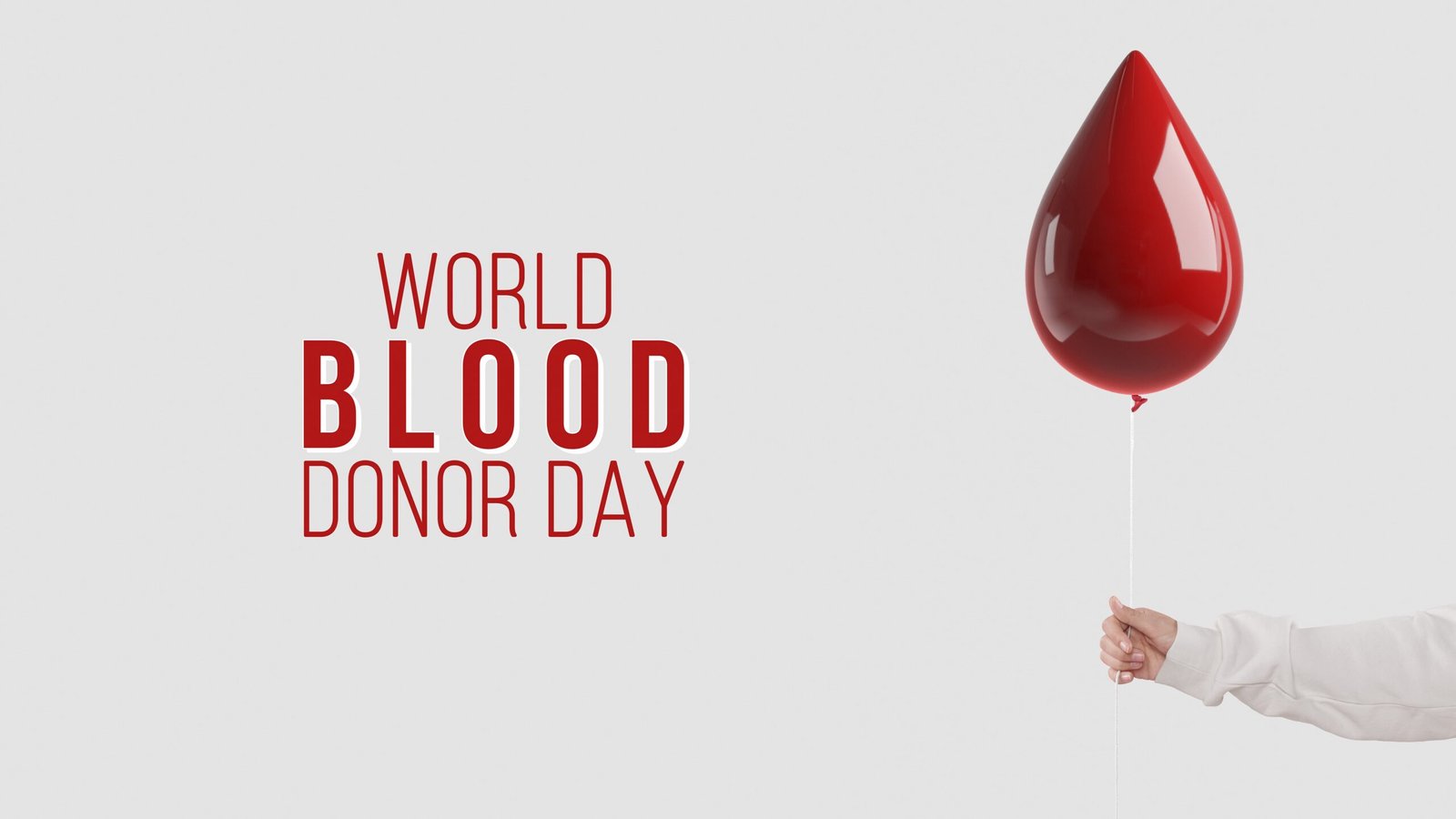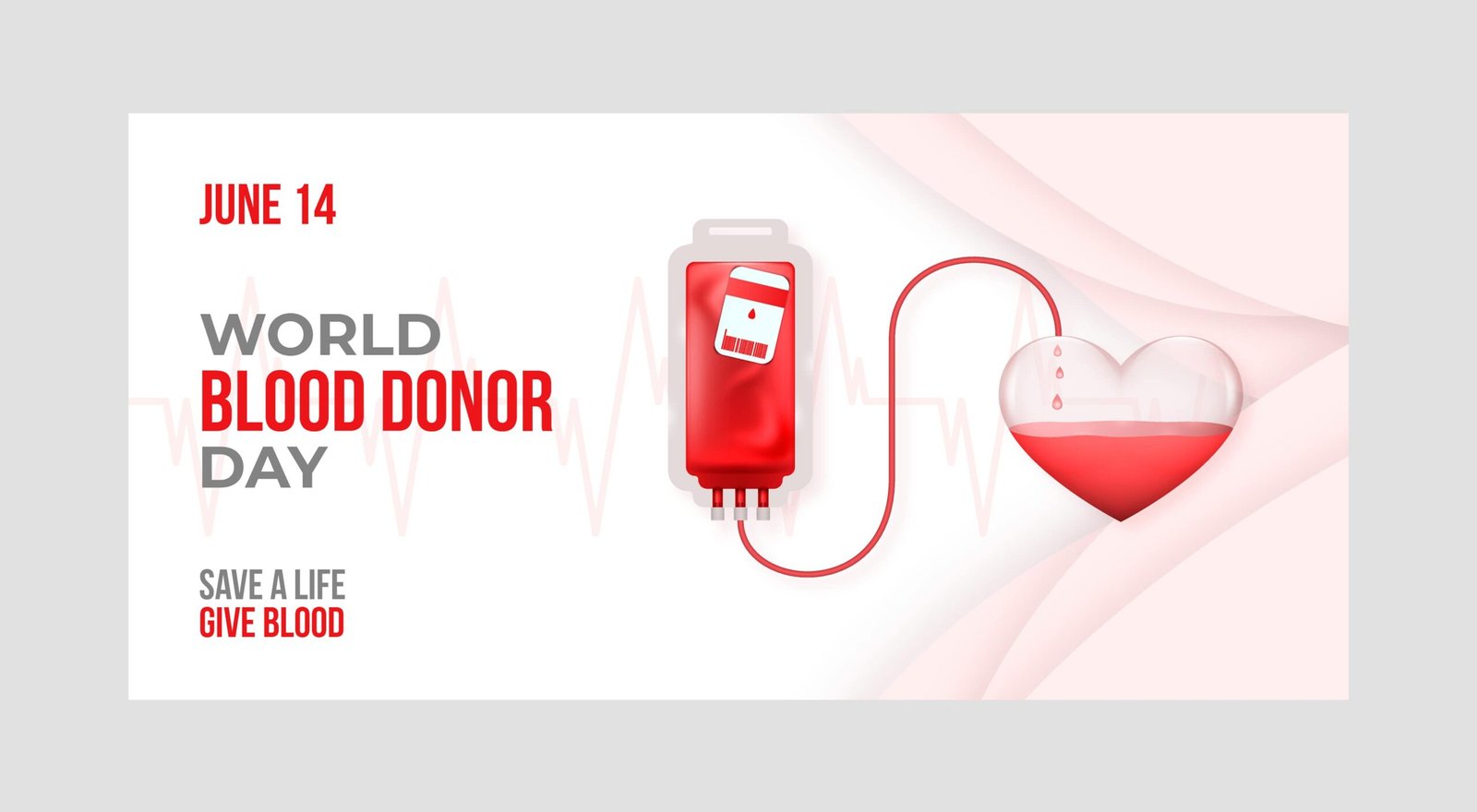World Blood Donor Day 2024 is celebrating its 20th year of celebration this year. Consequently, “20 years of celebrating giving: thank you blood donors!” is this year’s theme. 2004 marked the inaugural World Blood Donor Day. This day also serves as a chance to honor the vital role that blood donors play in preserving lives and enhancing wellbeing.

Blood donation is a remarkable act of kindness that plays a crucial role in modern healthcare. Donated blood is vital for treating numerous medical conditions, including severe blood loss, anemia, and cancer. In the process, individuals voluntarily give their blood to organizations or blood banks, which then distribute it to those in need. This ongoing effort ensures a steady supply of healthy blood, a cornerstone of effective healthcare systems worldwide. As we approach World Blood Donor Day 2024, it is essential to reflect on the importance of this life-saving practice and encourage more people to participate.
Date and Significance of World Blood Donor Day 2024
The 14th of June is designated as World Blood Donor Day each year. This year, it falls on a Friday, offering an ideal opportunity to highlight the significance of blood donation. The theme for 2024, “20 Years of Celebrating Giving: Thank You, Blood Donors,” underscores two decades of recognizing the selfless contributions of blood donors around the globe. This milestone is not only a moment to honor these individuals but also a chance to raise awareness about the ongoing need for blood donations. The World Health Organization (WHO) emphasizes the critical role blood donors play in saving lives and improving health, urging more people to join this noble cause.
A Glimpse into History
The history of blood transfusion dates back to 1940 when scientist Richard Lower successfully performed a blood transfusion between two dogs without any adverse effects. This pioneering work laid the foundation for modern blood transfusion techniques, revolutionizing medical practice. The successful transfusion between animals demonstrated the potential for similar procedures in humans, paving the way for safe and effective blood donations and transfusions.
Recognizing the importance of blood donation, the World Health Assembly designated June 14 as World Blood Donor Day in 2005. Ever since the purpose of this particular day has been to thank people who donate blood voluntarily for their gifts of life and to spread knowledge about the importance of healthy blood and its components. Each year, countries around the world organize events and campaigns to promote blood donation, emphasizing its vital role in healthcare.
The Lifeblood of Healthcare
Blood is often referred to as the lifeblood of healthcare for a good reason. It is essential for treating a variety of conditions and emergencies. Patients undergoing major surgeries, those involved in accidents, and individuals battling chronic illnesses such as cancer often require blood transfusions. Blood donations are also crucial for individuals with certain medical conditions, such as thalassemia and sickle cell anemia, who need regular transfusions to maintain their health.
Moreover, the impact of blood donation extends beyond the immediate recipients. It also supports medical research and the development of new treatments. For instance, donated blood is used in research to understand various diseases and develop vaccines and other therapies. In times of crisis, such as natural disasters or pandemics, the demand for blood can surge, making regular donations even more critical.

Why Your Donation Matters
Despite the continuous need for blood, many people remain unaware of the importance of regular donations. Blood has a limited shelf life; red blood cells can be stored for up to 42 days, platelets for about five days, and plasma can be frozen for up to a year. This finite lifespan means a constant supply is necessary to meet the ongoing demand.
One of the most significant barriers to blood donation is a lack of awareness and understanding. Many people fear the process or are unsure about their eligibility. However, donating blood is a simple, safe procedure that typically takes less than an hour. Most healthy adults can donate blood every 56 days, while platelet donors can give more frequently.
You are giving people in crisis a saving grace when you donate blood. Each donation can save up to three lives, making it one of the most impactful acts of generosity one can offer. Furthermore, regular blood donors often report a sense of fulfillment and purpose, knowing they are making a tangible difference in their communities.
Celebrating the 20th Anniversary
This year marks the 20th anniversary of World Blood Donor Day, a milestone that highlights two decades of raising awareness and encouraging donations. The WHO’s message for this special year is clear: to thank the millions of blood donors worldwide and recognize their invaluable contributions. It is also a time to address ongoing challenges in blood donation and transfusion services, such as ensuring a safe and sufficient blood supply in all regions, particularly in low- and middle-income countries.
The celebration of World Blood Donor Day 2024 is not just about looking back; it is also about looking forward. It is a call to action to continue the progress made over the past two decades and strive for a future where safe blood transfusion is universally accessible. The WHO and other organizations are working tirelessly to promote voluntary, unpaid blood donation as a standard practice globally.
How You Can Get Involved
There are many ways to participate in World Blood Donor Day and support the cause of blood donation:
Donate Blood: The most direct way to contribute is by donating blood. Contact your local blood bank or hospital to find out where and when you can donate.
Spread Awareness: Use social media platforms to share information about the importance of blood donation. Urge coworkers, friends, relatives, and family to make a donation.
Organize a Blood Drive: If you are part of an organization or community group, consider organizing a blood drive. This can significantly increase the number of donations and raise awareness.
Volunteer: Many blood donation centers and organizations need volunteers to help with various tasks. Your time and energy have the potential to have a significant impact.
Educate Yourself and Others: Learn more about the process and benefits of blood donation. Being well-informed allows you to advocate effectively for the cause.
As we celebrate World Blood Donor Day 2024, let us honor the spirit of giving and acknowledge the countless lives saved through the generosity of blood donors. Your contribution, whether by donating blood or raising awareness, is invaluable in building a healthier, more resilient world. Together, we can ensure that safe blood is available to all who need it, today and in the future.
Also Read:

The Psychology of Love: Why Valentines Day Matters More Epic Than You Think
Discover the psychology of love and why Valentines Day is more important than you think. Learn how love impacts the brain, strengthens relationships, and boosts

Premier League Highlights: Arsenal Humiliate Man City 5-1, Spurs and Palace Secure Crucial Wins
Arsenal demolished Manchester City 5-1 in a statement premier league highlights win, reigniting their title hopes. Meanwhile, Crystal Palace stunned Man United 2-0, and Tottenham

How Budget 2025 Impacts the Indian Middle-Class: Major Tax Benefits and Glaring Omissions
Budget 2025 offers major tax relief to the middle class, including zero tax on incomes up to ₹12 lakh. However, it misses out on incentives

Degrees vs Employability: Why “Highly Qualified Degree Holders” Struggle to Find Jobs While “Less Qualified Individuals” Get Hired Faster!
Many highly qualified individuals struggle to secure jobs, while less qualified candidates get hired quickly. This Degrees vs Employability paradox is caused by employer preferences,

The Power of Mindset: Why Looking Poor Doesn’t Make You Poor, but Thinking Poor Does!
Discover why looking poor doesn’t define your wealth but thinking poor does. Learn the power of mindset and how a growth-oriented mindset can lead to

Overthinking: How It’s Damaging Today’s Youth – Causes and Cure in 2025
Understanding how overthinking is silently damaging today’s youth, from its causes rooted in societal pressure and social media to its long-term effects on mental health.
